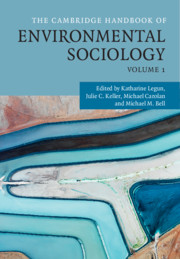Book contents
- The Cambridge Handbook of Environmental Sociology Volume 1
- The Cambridge Handbook of Environmental Sociology
- Copyright page
- Contents
- Figures
- Tables
- Contributors
- Foreword
- Introduction
- Part I Theory in Environmental Sociology
- Part II The Economy and Environmental Sociology
- 6 Material Worlds: Understanding the Relationship of Capital and Ecology
- 7 Green Economies and Community Wellbeing
- 8 Beyond the Limits to Growth: Neoliberal Natures and the Green Economy
- 9 The Ecosocialist Alternative
- 10 Commons, Power, and (Counter)Hegemony
- 11 Emplacing Sustainability in a Post-Capitalist World
- Part III Culture and Environmental Sociology
- Part IV Politics, Power, State
- Part V Social Justice
- Index
- References
7 - Green Economies and Community Wellbeing
from Part II - The Economy and Environmental Sociology
Published online by Cambridge University Press: 05 November 2020
- The Cambridge Handbook of Environmental Sociology Volume 1
- The Cambridge Handbook of Environmental Sociology
- Copyright page
- Contents
- Figures
- Tables
- Contributors
- Foreword
- Introduction
- Part I Theory in Environmental Sociology
- Part II The Economy and Environmental Sociology
- 6 Material Worlds: Understanding the Relationship of Capital and Ecology
- 7 Green Economies and Community Wellbeing
- 8 Beyond the Limits to Growth: Neoliberal Natures and the Green Economy
- 9 The Ecosocialist Alternative
- 10 Commons, Power, and (Counter)Hegemony
- 11 Emplacing Sustainability in a Post-Capitalist World
- Part III Culture and Environmental Sociology
- Part IV Politics, Power, State
- Part V Social Justice
- Index
- References
Summary
The promise of an economy that creates good jobs, promotes social justice, and improves environmental quality is an alluring one. Proponents of a green economy argue that businesses and communities can overcome contradictions and conflicts between economic, social, and environmental goals through pursuit of the triple bottom line. Yet there is little consensus on what the green economy is and how to achieve it. In this chapter, we review the empirical studies on existing green economic arrangements in different parts of the world. We identify four streams of activities: macroeconomic restructuring, spatial replanning, industrial redesign, and local revitalization. Our review suggests that existing empirical studies remain overwhelmingly practical in their orientation, which leaves much room for theoretically motivated environmental sociological analyses. We conclude with a call for an environmental sociology of green economies that has the potential to enrich the academic literature and enable real-world transformations.
- Type
- Chapter
- Information
- The Cambridge Handbook of Environmental Sociology , pp. 107 - 123Publisher: Cambridge University PressPrint publication year: 2020

